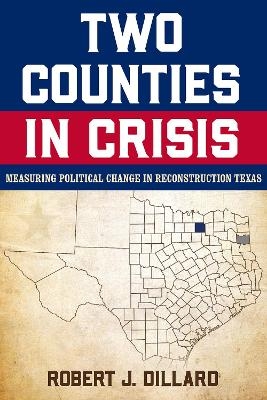
Two Counties in Crisis Volume 8
Measuring Political Change in Reconstruction Texas
Seiten
2023
University of North Texas Press,U.S. (Verlag)
978-1-57441-907-8 (ISBN)
University of North Texas Press,U.S. (Verlag)
978-1-57441-907-8 (ISBN)
Offers a rare opportunity to observe how local political cultures are transformed by state and national events. Utilizing an interdisciplinary fusion of history and political science, Robert J. Dillard analyses two disparate Texas counties and examines four Reconstruction governors to aid the narrative and provide additional cultural context.
Two Counties in Crisis offers a rare opportunity to observe how local political cultures are transformed by state and national events. Utilizing an interdisciplinary fusion of history and political science, Robert J. Dillard analyzes two disparate Texas counties—traditionalist Harrison County and individualist Collin County—and examines four Reconstruction governors (Hamilton, Throckmorton, Pease, Davis) to aid the narrative and provide additional cultural context.
Commercially prosperous and built on slave labor in the mold of Deep South plantation culture, East Texas’s Harrison County strongly supported secession in 1861. West Texas’s Collin County, characterized by individual and family farms with a limited slave population, favored the Union. During Reconstruction, Collin County became increasingly conservative and eventually bore a great resemblance to Harrison County. By 1876 and the ratification of the regressive Texas Constitution, Collin County had become firmly resistant to all aspects of Reconstruction.
Two Counties in Crisis offers a rare opportunity to observe how local political cultures are transformed by state and national events. Utilizing an interdisciplinary fusion of history and political science, Robert J. Dillard analyzes two disparate Texas counties—traditionalist Harrison County and individualist Collin County—and examines four Reconstruction governors (Hamilton, Throckmorton, Pease, Davis) to aid the narrative and provide additional cultural context.
Commercially prosperous and built on slave labor in the mold of Deep South plantation culture, East Texas’s Harrison County strongly supported secession in 1861. West Texas’s Collin County, characterized by individual and family farms with a limited slave population, favored the Union. During Reconstruction, Collin County became increasingly conservative and eventually bore a great resemblance to Harrison County. By 1876 and the ratification of the regressive Texas Constitution, Collin County had become firmly resistant to all aspects of Reconstruction.
Robert J. Dillard received his PhD in political science from Texas Tech University and MA in history from Texas A&M University–Corpus Christi. He now serves as an associate professor of political science at Texas A&M University–Corpus Christi.
| Erscheinungsdatum | 19.09.2023 |
|---|---|
| Reihe/Serie | Texas Local Series |
| Zusatzinfo | 5 b&w illus. Map |
| Verlagsort | Denton |
| Sprache | englisch |
| Maße | 152 x 229 mm |
| Gewicht | 272 g |
| Themenwelt | Sachbuch/Ratgeber ► Geschichte / Politik ► Regional- / Landesgeschichte |
| Geisteswissenschaften ► Geschichte ► Allgemeine Geschichte | |
| Geisteswissenschaften ► Geschichte ► Regional- / Ländergeschichte | |
| Geschichte ► Teilgebiete der Geschichte ► Militärgeschichte | |
| ISBN-10 | 1-57441-907-2 / 1574419072 |
| ISBN-13 | 978-1-57441-907-8 / 9781574419078 |
| Zustand | Neuware |
| Informationen gemäß Produktsicherheitsverordnung (GPSR) | |
| Haben Sie eine Frage zum Produkt? |
Mehr entdecken
aus dem Bereich
aus dem Bereich
neueste Manipulationstechniken als Waffengattung der NATO
Buch | Softcover (2023)
Westend (Verlag)
24,00 €


